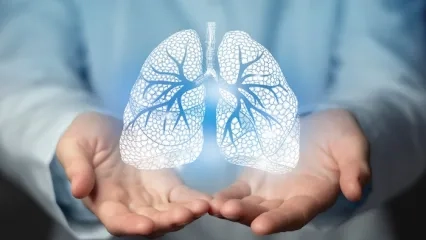Alo Yeditepe
Alo Yeditepe
Allergy and Asthma During Pregnancy
Noting that allergies and asthma are among the most common diseases during pregnancy, Yeditepe University Koşuyolu Hospital Chest Diseases Specialist Lecturer Dr. Seha Akduman says, “Uncontrolled asthma and allergies increase the risk of miscarriage and adversely affect the development of the baby. Smoking during pregnancy, occupation, outdoor and indoor air pollution, pollen period, having a pet at home, and stress are the most important factors triggering asthma.”
What Is the Probability of Encountering These Problems in Those Who Do Not Have Asthma and Allergies Before the Pregnancy Period?
The effects of pregnancy on asthma and allergies are variable and unpredictable. Sometimes, pregnancy may be the first trigger and initiator of asthma and allergies. In addition, some asthmatic patients have fewer complaints during pregnancy and feel very comfortable during pregnancy. Complaints may reappear after the pregnancy is terminated. While the complaints of some patients increase during pregnancy, the complaints of others do not change.
Are Asthma and Allergies a Type of Genetic Disease, or Do Changes in Living Conditions Together with Age Increase the Risk of These Diseases?
It is known that asthma and allergies are genetic. However, these diseases can show personal characteristics. The disease can occur at any age. The environment in which the person lives, socio-economic status, and other accompanying diseases can affect the emergence and course of the disease. Asthma and allergies are generally more common in regions with high socio-economic status. The reason for this is explained by the hypothesis of being exposed to less infection.
What Are the Types of Allergies That Can Be Experienced During Pregnancy?
There is no difference between the allergens that a normal person and a pregnant person may encounter. The most common ones are house dust mites, pollen, animal epithelium, mold fungi, and food.
Uncontrolled asthma has adverse effects on pregnancy. The greater the severity of asthma, the weaker the baby's oxygenation, which negatively affects intrauterine growth. The risk of miscarriage is high in such pregnancies and frequent respiratory tract infections are observed. Therefore, asthma must be treated and kept under control during pregnancy.
Do Any Changes Occur in Respiratory Tract During Pregnancy?
During pregnancy, changes occur in the respiratory tract as in the whole body. Especially in the upper respiratory tract, edema, and increased secretion occur in the third period of pregnancy (6 - 9 months). As the pregnancy progresses, as the uterus grows and pushes the abdominal organs upward, the diaphragm muscle is pulled upward, which puts pressure on the lungs. Shortness of breath is a common condition, especially in the last 3 months.
What Are the Environmental Factors that Trigger Asthma?
Smoking during pregnancy, occupation, outdoor and indoor air pollution, pollen period, having a pet at home, various smells, drugs, and psychological factors are the most important triggers of asthma.
What is the Risk of the Development of Asthma or Allergy Disorders Experienced During Pregnancy in the Baby After Birth?
The risk of developing allergy or asthma in a person with a family history of asthma or allergies is 4-5 times higher than in the normal population. Therefore, a person born to an asthmatic mother increases the risk of developing asthma in the future.
What Precautions Should Expectant Mothers Take to Avoid Asthma and Allergies During Pregnancy?
If there is no previous history of asthma or allergies, there is no need to take any precautions. If complaints develop, it is necessary to consult a doctor. If there is a known disease, it is necessary to be checked immediately when it is understood that she is pregnant, to use her medications regularly, not to smoke, and to pay attention to the cleanliness of the home environment. Medications should never be discontinued. Some allergy medications are not used during pregnancy. During this period, the doctor needs to decide which medications to use and how to use them, and the patient should comply with this.
About
Faculty and Year of Graduation:
Gazi University Faculty of Medicine, 2007
”
See Also
- How to Cleanse Your Lungs?
- Is Breathing Air Dangerous in Fires?
- What is Electronic Cigarette Disease (EVALI)? EVALI Symptoms and Treatment
- What is COPD? Symptoms and Treatment of COPD
- Long Journeys Increase the Risk of Embolism!
- What Asthma and COPD Patients Should Pay Attention to When Using Air Conditioning!
- What is Allergy? What are the Symptoms of Allergy?
- What is Desert Dust? Harms of Desert Dust
- Lung Cancer Screening Age
- What is Good for Cough? How to Cure Cough?
- Lung Cancer Symptoms and Treatment
- 10 Ways to Have a Sound Sleep in the Heat
- What Should Asthma Patients Be Cautious About?
- Does Poor Quality Sleep Increase The Risk of Asthma?
- What Causes Insomnia, Diagnosis and Treatment
- 9 Common Misconceptions About COPD
- Causes, Symptoms, and Treatment of Asthma
- It Is Aimed to Eliminate Tuberculosis Worldwide By 2030
- Lung Patients Should Not Stop Their Medications
- 4 Significant Preliminary Symptoms of Lung Cancer
- How Does Acid Rain Affect Human Health?
- The Slowing Traffic in Istanbul Increases the Risk of Cancer!
- The American Cancer Society Has Announced; The Age of Screening For Lung Cancer Has Decreased
- Hidden Lung Cancer Cases Revealed in Tomographs Taken Due to Coronavirus
- Obesity is Both a Cause and Consequence of Sleep Apnea
- Asthma and COPD Attack Season Begins
- Lung Cancer
- Snoring and Its Treatment
- Using Antipyretics Uncontrolled Can Hide Pneumonia Symptoms
Alo Yeditepe




